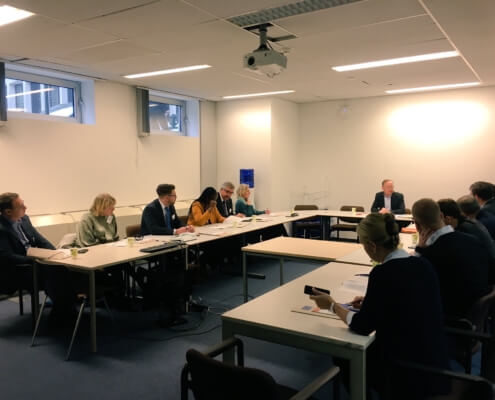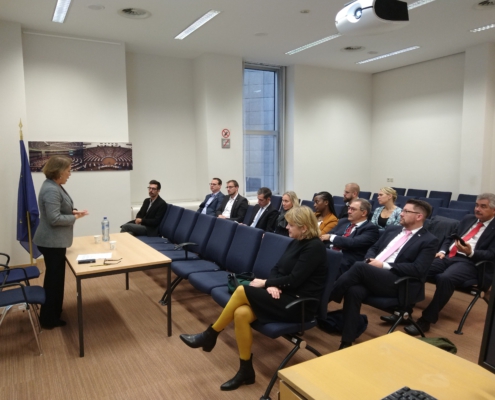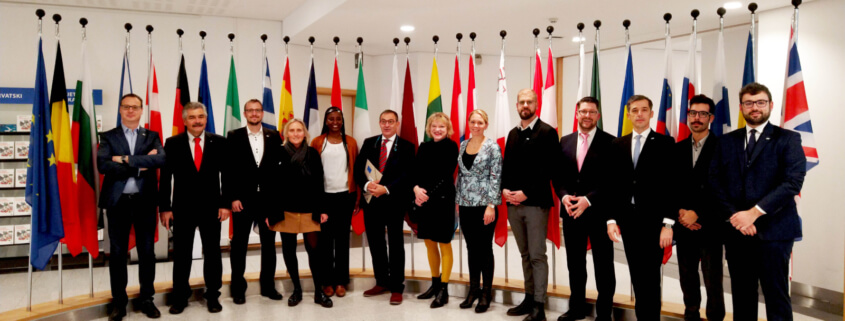Pilot EU Training for Managers by CEC European Managers
On 5-7 November 2019, CEC European Managers conducted an EU pilot training for managers. The scheme was introduced to equip managers affiliated with CEC European Managers with expert-level knowledge about EU institutions, policy-making and advocacy techniques. During the 3-day programme, participating managers could experience and learn about decision-making mechanisms, the European social dialogue, manager representation and EU policies in the domains of employment and social affairs, climate policies and lifelong learning policies. For CEC European Managers, it was an occasion to learn from managers’ experience on the ground.
A total of 9 managers from different backgrounds and sectors participated in the pilot scheme together with Ebba Öhlund and Maxime Legrand from CEC’s Excecutive Committee and CEC staff. The group consisted of managers from Italy, France, Germany, Belgium, Czechia, Sweden, Slovenia and Serbia. The professional and individual diversity of the participants reflected well the general managerial population of 13,6 million in the EU alone.
“European integration and intercultural learning is a question of practice. With our training programme, we wanted to show that managers independently of their sector, country, sexual orientation, skin colour or education can learn together and contribute constructively to CEC advocacy, EU leadership development and give feedback on European social dialogue” highlights CEC Deputy Secretary General Ebba Öhlund. “If we are to manage our current challenges in the EU, we have to learn to listen to each other and build on each others’ strenghts.”
On the first day, participants got a first overview on the functioning of the EU and the role CEC plays as a European stakeholder. Participants have been introduced to different approaches to policies and advocacy, as well as their concrete declination in the European public policy agenda. In the late afternoon, a visit on European history, historic narratives and national perspectives was organised at the Museum of European History in Brussels’ European quarter.

Exchange with Sven Matzke, DG Employment
On the second day, participants had the opportunity to learn about EU decision-making from first hand experiences. Both the formal decision-making procedures and the interest formation dynamics have been looked at with a particular attention to civil society. In the morning, the visit of the DG Employment (European Commission) has shed light on its globally unique portfolio of competences in the legislative and executive domains. Sven Matzke and Danny Scheerlinck from the Social Dialogue Unit have presented the main achievements of European social dialogue (both intersectoral and sectoral) and the European Commission activities in the domain of social and employment affairs, which have stood high on the agenda of the Juncker Commission. In the afternoon, the visit of the EESC has allowed participants to learn about the formal implication of civil society in the opinion-building of EU institutions. Christophe Lefèvre, EESC member affiliated to the French CEC member association CFE-CGC, has given a presentation on impactful opinions, such as on consumer protection or Artificial Intelligence, adopted by this body.

Exchange with MEP Daniela Rondinelli
On the final day of the training, participants have learned about the functioning of the European Parliament and the specificities of its involvement in the legislative process. During the meeting with Italian MEP Daniela Rondinelli, exchanges on the development of the EU’s social dimension, the protection of labour rights and the parliament’s internal functioning were held. Ms. Rondinelli highlighted the importance of the bridge building role of managers between employers and workers both in company-level social dialogue and at European level. Only by working together can we make the European social market economy fit for the future. Thereafter, members from the cabinet of MEP Fredrik Federley explained in-depth the compromise-finding for European climate and environmental policies. Bringing sustainable business practices, environmental and climate legislation and international coordination together is not an easy task, but a necessary one that will provide competitive advantages to a greener EU economy.
Finally, participants were also able to discuss the future development of the managerial profession in the light of demographic, societal and environmental developments. Better lifelong learning and more European exchanges, such as through the training programme, were some of the policies identified as beneficial for all European managers. This is also one of the reasons why CEC calls for making the European Erasmus+ programme a mobility and lifelong learning scheme (in the next Multiannual Financial Framework of the EU) accessible to a large pool of managers and workers.



